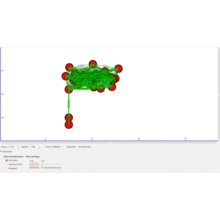Category Archive: 'M.Tech Projects in Wireless Communication'
In wireless sensor networks securing code update is essential for many crucial military applications. The nodes deployed in border areas in the military region called the border sensor nodes are the more sensitive nodes. The border sensor nodes need to do some special tasks compared to other intermediate sensor nodes. So the code update to […]
Wireless power transfer (WPT) is a kind of power transmission technology with which load devices can be supported to take power from the power source in a non-contacting way. Hollow solenoidal coils are used as resonant coils extensively in engineering projects which are usually analyzed based on magnetostatic fields. In practice coils are often excited by […]
In this paper, we review some work we have carried out in the area of fiber-based small cell backhauling in particular focussing on the energy efficient transport schemes and network planning. Our study shows that for densely packed small cells in an urban scenario, analog transport of thewireless signals over the optical link is most energy […]
In this paper, we propose area transmission efficiency to evaluate the performance of single-user multiple-input multiple-output (SU-MIMO) and multi-user MIMO (MU-MIMO) in wireless mesh networks (WMNs). The area transmission efficiency is the number of packets that can be transmitted per unit time and per area, and is calculated by considering the multiplexing effect of MIMO and the […]
Emerging applications in brain-machine interface systems require high-resolution, chronic multisite cortical recordings, which cannot be obtained with existing technologies due to high power consumption, high invasiveness, or inability to transmit data wirelessly. In this paper, we describe a microsystem based on electrocorticography (ECoG) that overcomes these difficulties, enabling chronic recording and wireless transmission of neural signals from […]
Distributed opportunistic scheduling (DOS) techniques have been recently proposed for improving the throughput performance of wireless networks. With DOS, each station contends for the channel with a certain access probability. If a contention is successful, the station measures the channel conditions and transmits in case the channel quality is above a certain threshold. Otherwise, the station does […]
This paper investigates power allocation for reliable downlink transmission in cellular networks subject to quality-of-service (QoS) constraints. The reliability of data transmissions is assured by hybrid automatic repeat request protocol with incremental redundancy (HARQ-IR). By developing and evaluating the effective throughput of the HARQ-IR protocol for the downlink transmission under buffer-limited QoS constraints, we propose […]
In this letter, we investigate full-duplex (FD) secure beamforming design problem for multiple-input-single-output two-way communication systems. Our objective is to maximize sum secrecy rate under sum transmit power constraint. We propose a globally optimal solution which solves the optimization problem by two-dimensional (2-D) search. In each iteration of 2-D search, a semidefinite programming is solved. To reduce […]
In this paper, we investigate the energy-efficient resource allocation problem in a single-cell orthogonal frequency division multiple access (OFDMA) system to achieve the energy efficiency (EE) tradeoff among users. Rather than overall system EE, our objective is to maximize the EE for each individual user. Therefore, a multiple-objective optimization problem is formulated, which in general […]
This paper presents an investigation of the secrecy performance of amplify-and-forward (AF) distributed beamforming (DBF) and opportunistic relaying (OR) through K untrustworthy relays. The capacity scaling and achievable diversity order of a secure communication are derived for K → ∞ and in high signal-to-noise-ratio (SNR) regimes, respectively. The DBF is shown to convey confidential messages with a […]

 Click Here to watch our latest output video using NS3 simulator
Click Here to watch our latest output video using NS3 simulator  Click Here to watch our latest projects screenshots using NS3 simulator
Click Here to watch our latest projects screenshots using NS3 simulator